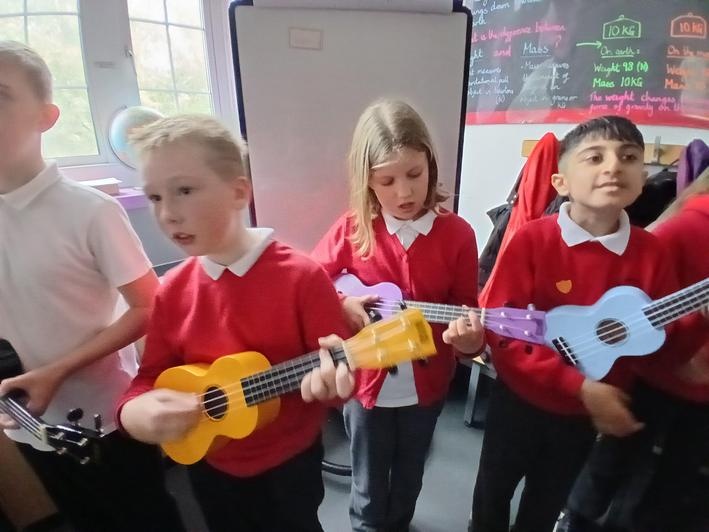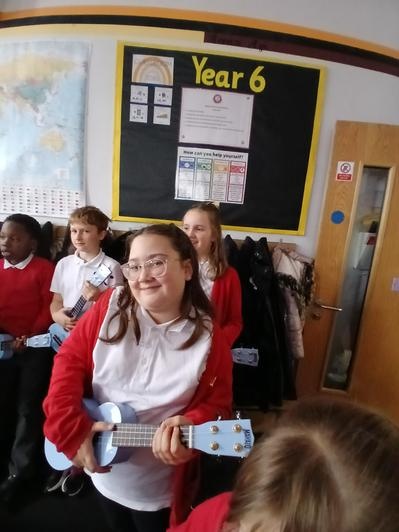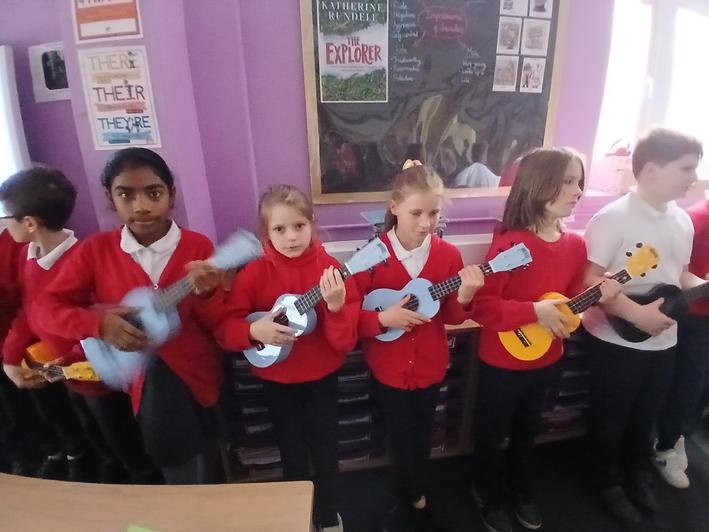
Farsley Westroyd Primary School & Nursery
Music
Music Curriculum Intent for Primary School
At Farsley Westroyd Primary School and Nursery, we promote a love of music by listening, singing, playing and moving to a range of music of different genre and from an array of world-wide cultures. We encourage hands-on experience with instruments, reading musical notation to play patterns and tunes, whilst also developing the fundamental skills of music such as pitch, dynamics, tempo and timbre. As a school who likes to shine, the children sing and perform regularly enjoying the connective nature and joy of this experience. Our curriculum is inclusive and teaching adapted to make learning accessible to all both in lessons and enhancement experiences. At the heart of our music teaching, is what music makes us feel. Ultimately, we want to have fun and feel the joy of listening and participating both alone and in group music sessions. However, we also explore the impact music can have on our emotions in a broader sense. Pupils create their own music, using appraisal as a tool to fuel their own creativity. The power of music to promote self-esteem and self-assurance is immense. At Westroyd we capitalise upon this with the array of opportunities, signposting and encouragement on offer so that pupils can be proud to be who they are.
Strands in the Music Curriculum
At Westroyd we use a whole school scheme called Charanga. In line with the curriculum for music and guidance from Ofsted, this Scheme moves away from the previous levels and learning objective/outcome concepts to an integrated, practical, exploratory and child-led approach to musical learning.
The following strands are covered in every lesson
- Listening and Appraising
- Musical Activities
- Warm-up Games
- Optional Flexible Games
- Singing
- Playing instruments
- Improvisation
- Composition
- Performing
What the children are taught is detailed below. Taken from the Music National Curriculum 2014.
Subject content Key stage 1
Pupils should be taught to:
- Use their voices expressively and creatively by singing songs and speaking chants and rhymes
- Play tuned and untuned instruments musically
- Listen with concentration and understanding to a range of high-quality live and recorded music
- Experiment with, create, select and combine sounds using the inter-related dimensions of music.
Subject Content Key stage 2
Pupils should be taught to sing and play musically with increasing confidence and control. They should develop an understanding of musical composition, organising and manipulating ideas within musical structures and reproducing sounds from aural memory.
Pupils should be taught to:
- Play and perform in solo and ensemble contexts, using their voices and playing musical instruments with increasing accuracy, fluency, control and expression
- Improvise and compose music for a range of purposes using the inter-related dimensions of music
- Listen with attention to detail and recall sounds with increasing aural memory use and understand staff and other musical notations
- Appreciate and understand a wide range of high-quality live and recorded music drawn from different traditions and from great composers and musicians
- Develop an understanding of the history of music.
Underpinning our curriculum are our key principles of
ENJOY, ACHIEVE, BELIEVE, TOGETHER
At Farsley Westroyd, we believe that music is a powerful means of expression that can inspire creativity and build confidence. Our music curriculum is designed to foster a love for music in every child, encouraging them to enjoy the process of learning, creating, and performing.
We aim to cultivate an environment where students believe in their ability to develop musical skills, no matter their starting point. By nurturing their talents and providing opportunities for growth, we instill a mindset that everyone can achieve personal excellence in music, whether through performing, composing, or appreciating the art.
Music is a collaborative experience, and we emphasize the importance of working together. Through ensemble work, group performances, and shared creative projects, students learn the value of teamwork, respect for others' contributions, and the joy of collective musical achievement.
Ultimately, we strive to create a music curriculum where all students can enjoy, believe, achieve, and come together as a community, celebrating the universal language of music
Music Evaluation and Development Plan 2425
Photographs


